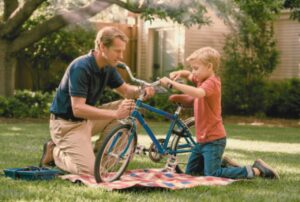Attachment theory describes the different ways people can act in relationships.
When someone has an avoidant attachment style They’re uncomfortable with growing emotionally bonded or close to someone else.
It can actually be broken down into two subcategories: “Dismissive Avoidant” and “Fearful Avoidant.
This kind of attachment theory usually carries on through adulthood and can affect relationships of all types.
Wondering if avoidant attachment applies to you or a loved one? Here are eight signs of an avoidant attachment style.

1. You were emotionally neglected in your childhood
Do you feel safer keeping your intense emotions to yourself? Childhood neglect can be traumatic and often develops into an avoidant attachment style.
According to Healthline, some parents might discourage their child from outwardly expressing both positive and negative emotions.
These parents may have ignored the needs of their child when they were emotionally vulnerable.
This is the sign of avoidant attachment because it conditions children to not only fend for themselves but also to hide their emotions and vulnerabilities from others.
2. You tend to suppress your emotions
Were you taught to view emotional expressions as a weakness?
Do you find that you’re better off dealing with things internally?
Do you tend to bottle your emotions and internally punish yourself for being vulnerable?
People with avoidant attachment are uncomfortable disclosing their vulnerabilities and they may look down on people who are more emotionally vulnerable than themselves.
Get Smarter Everyday Join Us On WhatsApp
3. You have trouble dealing with emotional intimacy
Do you have difficulty with emotional expression in relationships?
Do you keep conversations on a comfortable surface level or take extended periods of me-time?
When you have an avoidant attachment style you shy away from emotional closeness, afraid to reveal too much about yourself.
You struggle with not wanting to need others for anything.
In relationships, this emotional distance can make other people confused, angry and they might even take it personally.
But the truth is it’s actually a defense mechanism for you.
4. You have extreme boundaries
Do you have very specific, firm and strict boundaries?
This can go as far as restricting the amount of time you spend with others or refusing to share about certain parts of your life.
We do want to emphasize that there is absolutely nothing wrong with boundaries.
Having healthy boundaries is essential in maintaining healthy relationships.
However, people who have excessive boundaries may appear distant or closed off.
5. You have shallow relationships
You like to keep relationships at a shallow level whether it be romantic or platonic?
In a romantic relationship, you may refuse to meet your partner’s family or avoid topics and situations that would turn the relationship into a more serious one.
In a platonic relationship, you may refuse to go into emotional depth about yourself or have long conversations or see others that often.
Get Smarter Everyday Join Us On WhatsApp
6. Strong Independence
Are you extremely independent and self-focused?
Did you have to fend for yourself at an early age? Do you secretly look down on people who depend on others?
Independence by itself, isn’t a bad thing. As children grow, they should be increasingly more comfortable with making decisions on their own.
However, when children are forced to become independent too early due to neglect, they may develop a strong need to always solve problems on their own, rather than having developed a healthy level of self-sufficiency.
7. You have trust issues
Did you get the proper attention and care you deserved as a child? If not, it’s logical that you’d have a hard time trusting others throughout your life.
Even in adulthood, you struggle to trust, even in those closest to you and will try to distance yourself from wanting or receiving affection from others.
8. You’re critical, on yourself and others
When you have the avoidant attachment style, You may often find faults in those around you and this is more associated with a dismissive-avoidant attachment style.
According to Joyce Catlett M.A. from Psych Alive: the trauma that most commonly associated with this attachment style empowers the minds’ inner critical voice so much, that it actually overshadows their inner positive voice.
As a result, it’s easier for you to identify faults within yourself and others compared to the positive qualities.
We hope you enjoyed learning about the signs of avoidant attachment style.
Did you recognize any of these signs in yourself or any of your loved ones?
If you found this blog post insightful be sure to share it with those out there that are still not aware of it Don't forget to FOLLOW US on Facebook and hit the LIKE button for more new content. Thanks so much for reading.....






